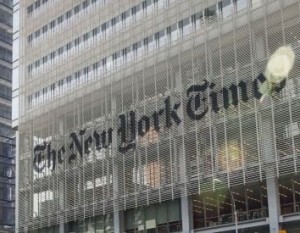John Hanger Vs. The New York Times: Round 72
Former Department of Environmental Protection Secretary John Hanger probably won’t be seeing Page One anytime soon.
Hanger has been extremely critical of the New York Times’ “Drilling Down” series, which has warned of radioactivity in fracking fluid, lax drilling regulation in Pennsylvania, and industry concern over the future of shale drilling, among other charges.
When reporter Ian Urbina published his first series of articles about drilling in Pennsylvania – the pieces concerning possible radioactivity — Hanger and former Governor Ed Rendell submitted a blistering letter to the editor.
If the goal of your report about natural gas drilling was to gratuitously frighten Pennsylvanians, then congratulations on a job well done. If it was to deliver an evenhanded examination of the critical balance that must be achieved between job creation, energy independence and environmental protection in regions with large natural gas deposits, then it was a mighty swing and a miss.
(Subsequent tests carried out by the DEP found normal radioactivity levels in waterways.)
In a separate blog post, Hanger called the report “deliberately false,” and accused Urbina of pushing a “fictional narrative. Last month, the two went head-to-head on the Diane Rehm show.
Given that history, it’s no surprise the Times’ Public Editor’s criticism of Urbina’s latest report brought out Hanger’s schadenfreude. Reviewing Urbina’s latest story, which examined alleged doubts about shale drilling’s viability, Arthur Brisbane wrote, “My view is that such a pointed article needed more convincing substantiation, more space for a reasoned explanation of the other side and more clarity about its focus. …[It] went out on a limb, lacked an in-depth dissenting view in the text and should have made clear that shale gas had boomed.”
Here’s how Hanger responded. Note how he avoided using Urbina’s name.
Today some justice for the cause of the truth has been rendered.
The NYT Public Editor censures the NYT Reporter and his editor. His piece is as tough as insiders reviewing other insiders will ever get.
In the military an equivalent letter of censure to that made by the NYT Public Editor would end the career of an officer. The military has a culture of honor, excellence, and accountability.
I doubt the NYT institution and its senior management will meet those high standards. The NYT Reporter is a rogue within the NYT for as long as he is on its payroll, but he is now disgraced by the conclusions of one of his own. That is a measure of accountability.

















